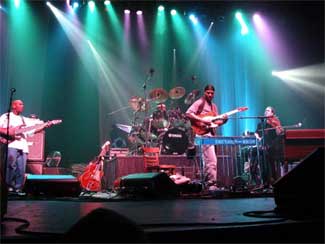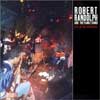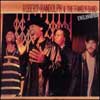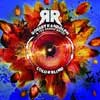Robert Randolph & The Family Band
Genre: Rock/Gospel/Instrumental
Official Web Site
Robert Randolph & The Family Band Bibliography: (click on each album cover to view tracks and Robert Randolph & The Family Band lyrics)
Robert Randolph & The Family Band Biography Robert Randolph and the Family Band are ready to change your life, just as music changed that of this group's dynamic leader. Raised in a firestorm of faith and danger, dividing his time between battles in the streets and safety in the arms of his music, Robert Randolph found his way up from darkness with help from a most unusual source: the pedal steel guitar.
That's right-those same slippery strings that weep and whine behind cowboy crooners and hula dancers. But in Randolph's world, which centers on the unique "sacred steel" tradition within the House of God Church, the pedal steel is a different animal, a source of ferocious, passionate sound. And in Randolph's young hands, it's a weapon, used to slash at darkness and rip away the shades that hide sunlight from our lives.
What Randolph has done isn't just about taking the spirit of the church into the wider world, though that's part of the picture. It's more than a story of beating heavy odds, of watching friends die or disappear while trying to find your own way out. Certainly it's more than an odd twist of fate how an urban New Jersey artist finding his voice through an instrument seldom seen outside of Nashville studios or Southern honky-tonks.
The buzz has actually been on for a while. Randolph began winning attention some three years ago, after being invited to join in on sessions for The Word, an adventurous marriage of gospel and "downtown" traditions with John Medeski and the North Mississippi Allstars. Interest picked up as he released Live At The Wetlands on his own Dare label, perhaps the most incendiary concert album of the year, recorded on the fabled venue's closing night with the Family Band that includes two of his cousins.
All of this has set the stage for Unclassified, their aptly titled, genre-defying Warner Bros. debut, co-produced by Robert Randolph and the Family Band and Jim Scott. There's an energy in these tracks that's unlike anything on the charts today-positive and inclusive, in the fashion of Stevie Wonder, Al Green or Sly and the Family Stone. It's about celebration, not about preaching; the handclap grooves, the words that welcome everyone, the whirl of dance and sweat and song and, always, the steel guitar, riding above it all, improbable yet the perfect voice to bring this message home.
Not that long ago, all of this would have seemed like a dream to Robert Randolph. When he was born, Irvington, New Jersey, was a comfortable town, with handsome homes and tidy little yards. But even as he grew up there, Randolph saw all that change. "We were close to Newark and Orange," he remembers, "so things got really bad. I'm talking about murder and crime and drugs. As a child, when you're around all these things, you somehow become a part of it because you're curious. And I became a part of it too."
With 2,000 students crammed into a space built for 800, Randolph's high school was one of the most dysfunctional in the state. Plenty of kids cut class regularly, with Randolph often leading the way. "I was a ringleader," he says. "I was like, 'Come on, let's go and do this! Let's hang out!' We'd go to parties. A fight would break out. A couple of guys would get shot, and I'm running home. I was a bad kid, on my eighth life with only one left to go."
Stress built at home too. Both parents were involved in the House of God Church at Orange, his father as a deacon, his mother as a minister. But they divorced right after Randolph began high school. "It was just my dad and me, and with him sometimes not coming home too soon, a lot of times it was just me. So I'd have people over, or just hang in the streets, being a knucklehead."
Unlike most of his friends, though, Randolph never entirely let go of the church. "I always liked going there," he explains. "At the same time I would see my aunts and uncles, who lived nearby. I still had them to talk to. They'd drive past, see me on the corner, and they never stopped praying for me. That helped turn me around."
Like everyone in his family, Randolph was musical. He got involved with playing at the House of God initially as a drummer for the youth choir. Their songs-"My Heart Sang A Song," "Your Grace And Mercy," "One More Time"-have stayed with him to this day. But so did a sound that was a critical part of the mix.
Since the 1930s, when Willie Eason began playing steel guitar at a House of God Church in Philadelphia, this denomination has been associated with the instrument. Used initially to substitute for organs which were too costly for many congregations to afford, it developed within an African-American tradition that had nothing to do with Hawaiian or country roots. Eventually, encouraged by several of his relatives, Randolph agreed to try it himself.
Robert, after first getting a simple six-string lap steel guitar, started out a bit cautious. "To be honest, I just wanted to check it out at first," he says. "I played it for a month, and then I didn't touch it for another year because it was so difficult. Then, when I was seventeen, I went back to it, and for some reason it started feeling really special to me. I spent hours practicing on it. It became my everything."
Withdrawing from street life, Randolph explored the instrument in the shelter of his home. When his father remarried to the daughter of sacred steel legend Ted Beard, Randolph accepted an invitation to spend some time at his stepmother's former home in Detroit. "Ted taught me so much about how to play and how to listen," he says. "He was like, 'I could teach you everything I know about music, but you'll never be able to sound like me.' I'm looking at him like, 'I want to play like you!' But he was right: I learned that you can never be like someone else, because everybody has his own thing. In fact, he said, 'If you keep that in mind and stay humble, then nobody will be able to do what you're doing.' A couple of months after that, I went back to my church in Orange with my steel guitar and started to play it in services." He was 17 years old.
Working with other young musicians, including his cousins and future Family Band members Danyel Morgan on bass and Marcus Randolph on drums, Robert quickly became a fixture at the church. His playing developed rapidly within the tradition, and he might have stayed on that course, content to play on Sundays and work day jobs during the week, if not for a tape that a friend loaned him one day in 1998.
That tape, a collection of Stevie Ray Vaughan tracks, hit Randolph hard. "The way he played his guitar, with so much soul, gave me a whole new outlook on music. Nothing beats playing with soul, when you give it your all. You can hear it in his playing, even in his notes. Even now, sometimes when we're in the studio I'll be thinking, 'Man, I want to get the greatest licks into this thing,' but when you're thinking about getting a great lick instead of playing what you feel, it never comes out right. Playing with soul is really the only way I can play."
Having learned how to tap into the emotions of the songs he played in church, Randolph was able to expand his range and draw from the spirit that fed other types of music. "I started trying to apply the same natural, positive thing I found in gospel music to secular music, so I could still have that purity and energy that people can grab onto. I listened to all kinds of new stuff I'd never heard before, not letting it confuse where I come from, but piecing it all together in new ways."
The more he progressed, the wider news of Randolph's talents spread. A demo that the pedal steel guitarist and his cousin Marcus recorded at Eric "Roscoe" Ambel's Brooklyn studio made its way to the North Mississippi Allstars, who recruited the Family Band to open at the Bowery Ballroom in New York. Avant-jazz organist John Medeski caught the set and invited Randolph to join with him and the Allstars on The Word.
A flurry of other gigs followed, at clubs in Greenwich Village and as opening act for a long list of artists, including the Derek Trucks Band, Victor Wooten, Soulive, Karl Denson's Tiny Universe-that testifies to the breadth of Randolph's appeal. Major labels clustered around him, contracts in hand, until Randolph chose Warner Bros., whose promise to not interfere with his sound won Robert's allegiance.
That sound is intact throughout Unclassified. "It's hard to record pedal steel the way we play it in church," he admits. "But with the engineer (and co-producer), Jim Scott, who's recorded and mixed everybody from Tom Petty to Celine Dion to the Red Hot Chili Peppers, his thing is to let the band play, and he helped us get the steel as it is. When you come to our show, bam, that sound is right in your face, not way in the background or somewhere in the air. It's a powerful instrument that sings."
This all comes through loud and clear throughout the new album. Just for a moment, skip ahead to "Good Times (3 Stroke)," one of the four instrumental tracks, and let the first few seconds wash over you. Randolph's unaccompanied intro has all the searing authority of a young and hungry Clapton, or of Stevie Ray at his best. And when the band kicks into its uptown strut, Randolph stretches into a long solo whose chops, rhythmic incisiveness, growling wah-wah work, and soaring, Hendrix-like high notes stand up against the best playing heard anywhere today, and not just from guitar players. This is enough to make the case: Randolph is a monster. And the steel guitar will never sound the same.
But Unclassified makes a bigger point than all that. This music touches listeners personally, not only because of its irresistible feel, but also the depth, even ambiguity, that adds dimension to the words. Listen to the almost unbearably funky "Nobody," for example, and the easy-going, sun-splashed "Soul Refreshing"-are these about earthly love or something greater? Or both? What about "Why Should I Feel Lonely," a future superstar's rumination on glamour and glitz just slightly tarnished by the title's rhetorical question? And when the mood is down, as conveyed by Danyel Morgan's heartfelt, pain-ridden vocals on the minor-key "Problems," Randolph still weaves hope into the story, like a silver thread through the fabric of despair.
Unclassified strikes very close to home. It is, like the gospel and hymns they still play on visits back to Orange, as much about the message as the messenger. "I'm just a young guy who comes from a neighborhood where I was surrounded by negative things," Randolph sums up. "But because I play this instrument, I've overcome all that. I want people to understand that they don't have to follow anybody. You've got your own heart and soul, and you should find it. That's what I'm trying to say."
|





